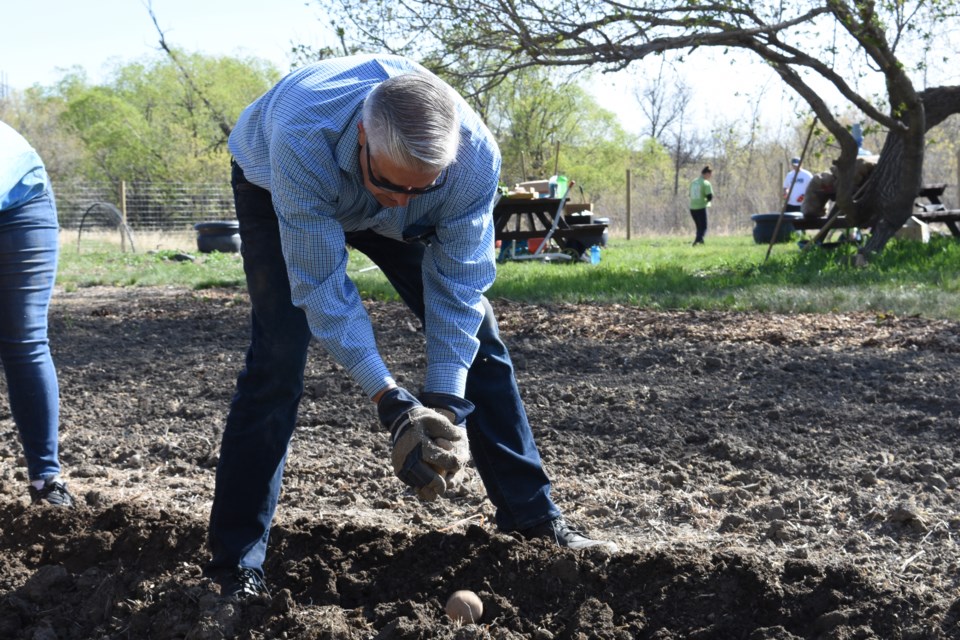With rakes and hoes in hand, more than a dozen volunteers broke ground at the Mosaic Community Food Farm and Orchard for another season of growing fruits and vegetables.
Staff and volunteers from the Wakamow Valley Authority, Moose Jaw and District Food Bank, Hunger in Moose Jaw and Riverside Mission — along with MLAs Warren Michelson and Greg Lawrence — rolled up their sleeves and planted potatoes, onions, carrots, squash, sweet potatoes, sunflowers, and other produce on May 22 during the fifth annual planting day.
Growing in the orchard are plums, apples, pears, blueberries, gooseberries, and other fruits.
The garden is located off First Avenue Southeast. The main garden is about 0.4 hectares (one acre) in size, while there are orchards on the north and south ends of the property that total one acre. Last year organizers harvested more than 1,700 pounds of produce.
Mosaic Potash is providing $40,000 to help this project grow.
“Wakamow Valley is so excited for another year to work on this great project (at) the Mosaic Community Food Farm,” said Todd Johnson, GM of the Wakamow Valley Authority. “This partnership comes together to support the community with fresh fruits and vegetables.”
Wakamow provides the staff to work on the farm and operate the machines, he explained. Volunteers from the multicultural centre will also spend time tending the garden this summer and learning about the growing process.
“It’s a fantastic program,” he said. “It’s not only giving us sustainable food, it’s (also) giving us a mini classroom to help people understand where food comes from and how it’s grown. That’s the bonus of having this in the park.”
The food grown will have a positive effect on clients, said Sharla Sept, executive director of Hunger Moose Jaw. This is one way to ensure low-income residents have food security and access to fruits and vegetables.
“We see a large problem” with food security in the community, she continued. While adults struggle, the organization also sees the negative effect of poor nutrition in schools. Hunger Moose Jaw provides lunches for more than 300 students through its child nutrition programs.
To help increase the yield this year, organizers installed a fence around the garden to keep out animals, said Johnson. It will then be up to nature — and adequate precipitation — to grow the food.
The food farm would not exist without the support of the non-profit partners and Mosaic, he added.
“We enjoy doing this. It’s a lot of fun,” said Mary Langman, supervisor for the land and mineral department at Mosaic Potash. “It is nice to get out of the office and give back to the community.
Langman added that staff come out to plant produce and then come back to help harvest.
“I am glad to be returning for my second year as the food farm co-ordinator,” said Owen Tillie, a summer student with Wakamow Valley. He also appreciates being able to use his education to contribute in a meaningful way.
Tillie is going into his fourth year of horticultural science at the University of Saskatchewan. He thought it was good to get hands-on since he could learn how produce is supposed to grow and what happens when things don’t turn out as expected.
It’s “super cool” to help meet the food needs of the community, he continued. Having nutritious food is a positive step for residents to get ahead and feel good about themselves.
Volunteers started picking produce last July, but organizers hope to start harvesting some produce by the start of June. Tillie pointed out it has been quite dry, which hasn’t helped with the growing process.
“I heard we’re going into our third year of drought, so it’s a great time to be a farmer,” he joked.




